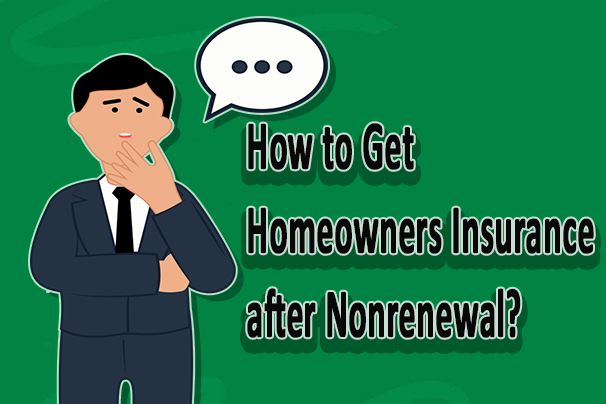How can I get Homeowners insurance after nonrenewal? A few months before your policy reaches the end of its term, your insurer will send a notice to you. Mostly, it’s an offer to continue your policy, but sometimes, it may be a nonrenewal notice. If you get a renewal notice, the insurance company will state the reasons they choose not to renew your policy. Sometimes it can be an issue that can be sorted out with your carrier.

In other cases, getting a nonrenewal notice means that you will have to start looking around for a new Homeowners insurance company to avoid a lapse in coverage. Home insurance nonrenewal can be very tiring as finding a new policy after being dropped can be very difficult. Read to the very end to know the reasons why insurers drop policyholders as well as how to get Homeowners insurance after Nonrenewal.
Reasons for Homeowners Insurance Non-Renewal
When insurers choose not to renew a policy, they will send a written notice to the homeowner stating the reason why. Below are some of the common reasons a Homeowners insurance provide may choose to non-renew a policy;
Your location may be considered as too high-risk
If a company sees they’re losing too much money on claims in an area, it might stop selling insurance there or reduce the number of people it covers in the location. For instance, if there were a lot of expensive claims in a certain area, like during the big wildfires in California, the insurance commissioner might stop the carriers from dropping over a million home insurance policies in the hardest-hit spots for a year.
You filed for too many claims
Insurance companies see people who have had lots of claims as risky customers. These folks are more likely to lose their insurance and have to pay more for a new one. If you’ve had lots of claims or been late with payments, they might see you as too risky to cover. Even getting a new dog or certain features in your yard, like a swimming pool or playground, could affect your getting your policy renewed.
Your insurance profile no longer meets the insurer’s requirements
Your profile has a huge impact on whether the insurer wants to provide coverage. If the risk that you represent is too high to make financial sense, the insurance company is not likely to renew your policy.
Your home is not maintained well
Sometimes, insurance companies send a third-party property inspector to your home for an exterior inspection. During the inspection, the inspector checks your home to see if it is maintained well. And if there are no safety hazards like the deteriorated exterior, debris on the property, or overgrown trees. If they find out the home is not maintained well, potentially increasing the risk of claims, the provide may choose to non-renew the policy
The insurer may discontinue underwriting
On certain occasions, an insurer may decide not to do business in your location. Or just stop selling the type of Homeowners insurance coverage you bought. When this occurs, the provider will let you know about the nonrenewal so that you can find an alternative insurer.
How to get Homeowners Insurance Coverage after Nonrenewal
Every state has its regulations for how an insurer can issue a nonrenewal notice. However, keep in mind that the average time notice before the nonrenewal starts is 45 days. From there, depending on the reasons for the decision, you have few options. These options include;
Address the situation
If your home has not been properly maintained, it may be right to take action and resolve the problem instantly. Submitting evidence to your insurer that you have resolved the cause of the decision may prompt it to reconsider the notice. Taking care of this very early may give you enough time to shop around for a new policy in case the policy is not approved for renewal after reconsideration.
Dispute the Nonrenewal
If you feel like the reason for the decision is not far, you have the option to question or dispute it. To do this, you will have to contact your insurance company’s consumer affairs division or contact you’re your state insurance department.
Shop around for a new policy
Letting your current insurance lapse could leave you without coverage. And increase your rates in the future. If you have a mortgage, one of the conditions of the loan is likely to keep continuous coverage. If your home is not covered, the lender could purchase force-place insurance on your behalf at a very expensive rate.
Check the date of the new insurance policy
When purchasing new home insurance, aim for the start date to match or precede your current coverage’s end date to prevent any gaps. Once you have sorted the new policy’s start date, send a copy to your lender to let them know about the update.
Go for a high-risk home insurance company
If your home has been considered high-risk, the best thing to do is to go for high-risk home insurance. Although, these policies can be very expensive than the regular home policy they can provide you with the coverage needed to avoid a lapse in insurance.
Make use of your state’s Fair Plan
Some state provides a Fair Access or Fair Plan to insurance requirements plan. This government insurance option is for homes that do not qualify for coverage in the private insurance industry.
The summary Is that a nonrenewal occurs at the end of the policy’s coverage term. And it happens for many reasons. Your insurance company might take this decision if you have been neglecting your home’s upkeep. Also, your location becomes too high risk, if you make too many claims. And if your insurance profile no longer meets the insurer’s requirements. Follow the guidelines on how you can get a new insurance policy after non-renewal written in this article. So that you can avoid a lapse in coverage and avoid your lender’s forced insurance
